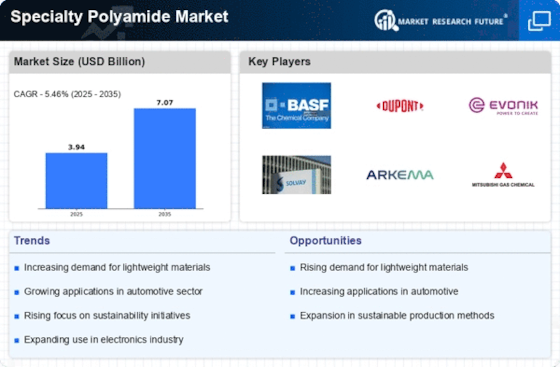Top Industry Leaders in the Specialty Polyamide Market

Specialty polyamides, the high-performance cousins of their nylon counterparts, are woven into a tapestry of demanding applications. From lightweight aircraft parts and cutting-edge medical devices to flame-retardant textiles and ultra-durable automotive components, these versatile polymers boast exceptional strength, heat resistance, and chemical resilience. The global specialty polyamide market, is a bustling hub where giants of the industry jostle for control alongside nimble innovators, all vying to weave their share of this profitable niche. Let's unravel the strategic threads, influential factors, and recent advancements shaping this dynamic realm.
Strategies Spinning Market Share:
- Technological Twists: R&D labs hum with creativity. Evonik Industries is pioneering bio-based specialty polyamides derived from renewable resources like castor oil, aligning with environmental concerns and expanding feedstock security. Meanwhile, companies like Solvay are developing high-performance polyamides with enhanced wear resistance and thermal stability, catering to demanding aerospace and automotive applications.
- Sustainability Focus: Green threads are being woven. Leading players like Arkema are investing in research and development of fully recyclable specialty polyamides, catering to stringent regulations and eco-conscious customers. Companies like Radici Group are also exploring closed-loop recycling systems, minimizing waste and extending the lifespan of these valuable materials.
- Product Diversification: Beyond the standard injection-grade varieties, companies like DSM are tailoring specialty polyamides for specific applications. From high-temperature resistant grades for oil and gas exploration to biocompatible versions for medical implants, this diversification caters to diverse needs and expands market reach.
- Regional Expansion: Asia-Pacific, with its booming aerospace, automotive, and medical device industries, holds immense potential. Companies like BASF are setting up production facilities in this region to capitalize on the local demand.
- Strategic Partnerships: Collaboration strengthens the fabric. For instance, DuPont partnered with a leading aircraft manufacturer to develop customized lightweight polyamides for aircraft components, reducing fuel consumption and enhancing performance.
Factors Dictating Market Share:
- Performance Prowess: Superior strength, chemical resistance, thermal stability, and lightweight properties are key metrics. Established brands like EMS-CHEMIE have built reputations for reliable performance, attracting loyal customers in critical applications.
- Cost-Effectiveness: Price remains a critical factor, particularly in mature markets. Chinese manufacturers often offer lower prices, challenging established players to optimize production and pricing strategies while maintaining quality.
- Regulatory Landscape: Stringent regulations on hazardous materials, end-of-life disposal, and biocompatibility dictate industry practices. Players who comply with these regulations, like Ube Industries with its sustainable production processes, gain a competitive edge.
- Application Diversity: Catering to diverse industries offers resilience. Companies with broad product portfolios like Chemours benefit from diversification, mitigating risks in saturated segments.
Key Players:
- Evonik Industries AG
- BASF SE
- Arekma SA
- Asahi Kasei Corporation
- Koninklijke DSM N.V
- du Pont de Nemours and Company
- LG Chem Ltd.
- Solvay S.A.
- INVISTA S.à r.l.
- Radici Group
Recent Developments:
- September 2023: Arkema launches a fully recyclable specialty polyamide for automotive interiors, meeting sustainability targets and offering valuable end-of-life options.
- October 2023: BASF collaborates with a leading medical device manufacturer to develop biocompatible polyamides for implantable devices, pushing the boundaries of medical technology and patient safety.
- November 2023: DuPont and its aircraft partner successfully implement new lightweight polyamide components in commercial aircraft, demonstrating significant fuel savings and paving the way for wider adoption.
- December 2023: A consortium of research institutions and chemical companies receives government funding to develop next-generation specialty polyamides with self-healing properties, aiming to extend product lifespan and minimize waste across diverse industries.










